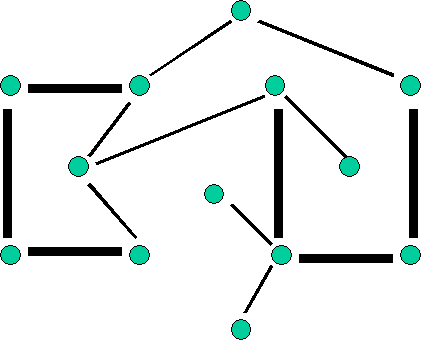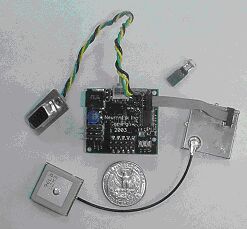(Under
Construction)
CSCI 7143-001:
Secure Sensor Networks
Fall
2004
Department
of Computer Science, University
of Colorado at Boulder
Abstract:
Sensor networking envisions a ubiquitous computing future in which
scattered
smart sensors combine to form dynamic, ad hoc, low power, and
self-configurable
wireless networks capable of monitoring their external environments and
relaying
their data to a smart spaces infrastructure. These sensor
networks will
operate in a variety of environments, including home, office, and
military, and
will assist in such activities as locating and identifying people
indoors as
well as tracking the motion of vehicles outdoors.
|
In
this graduate seminar, we will
-
explore the state-of-the-art in secure sensor networking
research by reading, presenting and discussing selected papers,
and
-
design innovative research projects in sensor
networks, covering such topics as:
-
if time permits, build sample applications using MANTIS OS on
sensor nodes, (see right, and http://mantis.cs.colorado.edu)
|

MANTIS sensor nodes (nymphs) with
GPS

|
We
will study how the unique constraints of sensor networks - wireless,
low power,
small form factor, limited memory/CPU - affect the design of networking
protocols as well as the design of the sensor nodes
themselves. We
will construct real sensor networks using actual leading edge sensor
nodes and develop hands-on familiarity with a variety of physical
sensors, including
thermal, magnetic, acoustic, and motion sensors. A
thorough understanding of TCP/IP networking, wireless networking, and
operating
system concepts is a prerequisite.


Grading
Students
will be asked to:
-
design
and build an innovative research project for presentation at the end of
the semester. Students should organize themselves into research
project teams. A final written report will be submitted.
-
for
each research paper in the assigned reading list:
-
participate in the class discussion of each paper
-
provide written summaries of each paper before
class
-
volunteer to present in class certain of the papers on the
reading list, on a rotating basis
-
develop
software programs on sensor nodes
25%
Final project presentation to class
25% Final project report
20% Class presentation of papers
15% Paper reviews and participation in discussion
15% Programming projects on sensors
Plagiarism
policy.
Religious observances policy.
Disability policy.

Research
Projects
Students will
be asked to build/create an innovative research project for
presentation at the
end of the semester. Students will form
teams of 2-3 members and work on projects as a team.
Teams and projects will be decided according to the timeline
below. Read ahead to topics that you'd be interested to do a
project in.
A list of suggested project ideas will be available later.
Students are welcome to formulate their own project ideas.
Each team will be required to present their project to the class at the
end of the course,
A final project report written in the style of a conference paper will
be handed
in following the presentation. If the final project is
sufficiently innovative, and is accepted as a paper
at a conference, then I'll pay for your trip to that conference (Past
projects
have led to publications at conferences in Sweden and Monterrey,
California).
|
Timeline for Project Presentations:
-
September 4-25: Project teams formed and topics discussed
with professor.
-
September 28: Final project proposal (abstract) due via email
and approved by professor
-
Weeks of October 4, 18 and November 1 and 15: Bi-weekly
progress meetings of each group with professor
-
December 2-9: Final project presentations. 40 minutes for
each team.
-
December 13: Final project reports due.
|

Paper
Reviews and Presentations
Students
are required to read,
present, and discuss graduate-level research papers throughout the
semester.
An average of 2-3 papers per week will be read. Written reviews
of each paper to be discussed in class are due prior
to the start of that class, and should be emailed to the instructor rhan@cs.colorado.edu.
Late reviews will not be accepted. For each paper, students
should write a review answering each of the following questions:
-
What problems (with prior work or the lack thereof) were addressed or
surveyed by the authors?
-
What
solutions were proposed or surveyed by the authors?
-
What
are the technical strengths and main contributions of the paper's
proposed solutions?
-
What are the technical weaknesses of the paper's proposed
solutions? What suggestions do you have to improve upon the
paper's ideas?
Each
paper to be discussed in class will be assigned to a
student to present in class. Assignments will rotate thoughout
the class.
Papers will be assigned approximately one week in advance of the
presentation
date. The presenter of a given paper must email their Powerpoint
slides to the
instructor rhan@cs.colorado.edu
by
midnight of the night before the presentation. The in-class
presenter of a particular paper
does not have to submit written reviews for any of the papers reviewed
that same
day in class. The paper schedule may vary over the course of the
semester,
e.g. as new papers become published at the most recent conferences.

Programming
Projects
There
will be one or two software programming projects in which students will
build
applications on actual physical sensor nodes, deployed outdoors and/or
indoors. Some examples of such projects could be:
-
Build
a multicast routing protocol for indoor sensor networks.
-
Build
a sense-and-forward application that takes GPS location data and
forwards it back to a base station using the previously built multicast
routing protocol.
We
will likely be programming in C on MANTIS OS on MICA2 motes. The
late policy on
programs is 10% off the grade if late within one day, 20% off the grade
for two
days late, 30% off the grade for three days late. Programs that
are
submitted more than three days late will no longer be accepted.
Programs
should be emailed to the instructor. More information will be
available on
the Announcements web page.

Announcements
As
the class progresses, announcements will be posted on the Announcements
Web page
of the class Web site.

